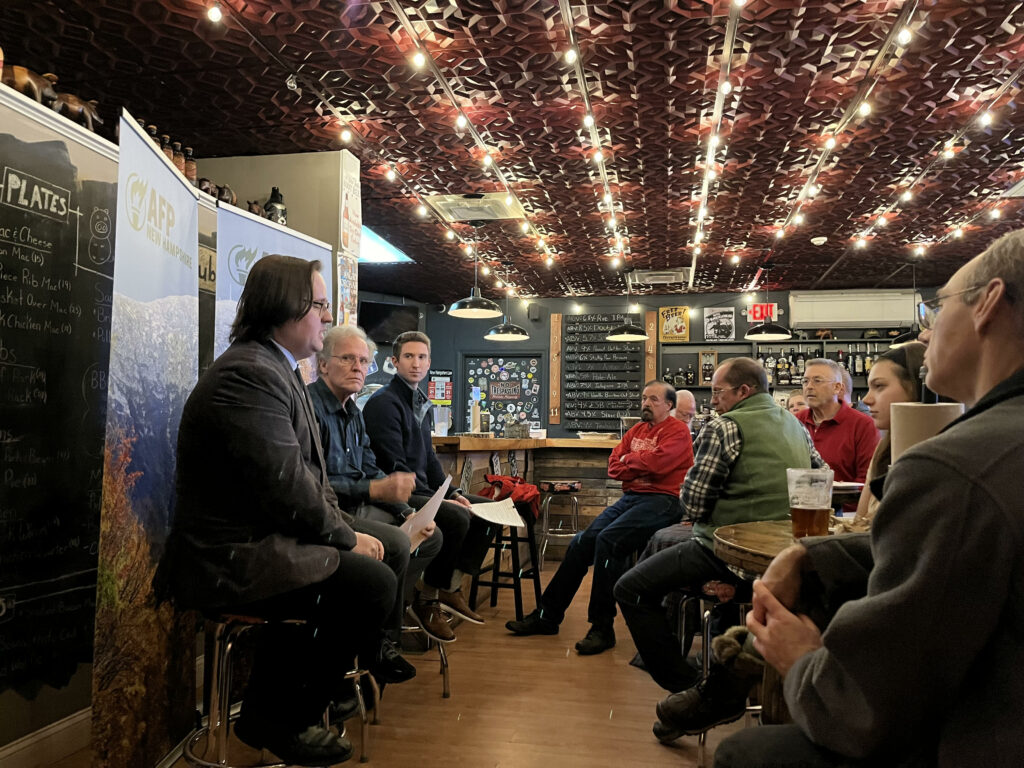A free-market group wants New Hampshire’s ‘Live Free or Die’ philosophy to include life on the internet as well.
At a recent Pints & Policy roundtable, hosted by Americans for Prosperity-New Hampshire (AFP-NH), local legislators and tech experts led a discussion exploring the challenges and opportunities surrounding digital privacy in today’s rapidly evolving landscape.
The good news for Granite Staters is that, according to most national rankings and metrics, they already enjoy some of the strongest protections in the nation when it comes to data privacy and other laws aimed at thwarting government surveillance.
In 2018, more than 80 percent of voters approved a constitutional amendment enshrining the “right to live free from governmental intrusion in private or personal information is natural, essential, and inherent.”
The challenge in 2023 and beyond for New Hampshire is to keep it that way.
State Rep. Keith Erf (R-Weare) joined Ross Connolly, AFP’s northeast regional state director, and AFP senior technology analyst James Czerniawski, to talk about legislation Erf is sponsoring to “flesh out” that 2018 amendment and further protect New Hampshire residents from unwarranted government data collection.

AFP senior technology analyst James Czerniawski (left) and State Rep. Keith Erf (R-Weare) joined Ross Connolly, AFP’s northeast regional state director, for Pints & Policy, December 21, 2023.
“I’m a computer science guy by background, so that’s the way I look at a lot of things,” Erf said. “Computer processing power and data storage capacity have become incredibly powerful and inexpensive, and that means vast quantities of information can be collected about everything we do online and even in the real world.
“[This information] can not only be searched and accessed by current traditional message, but by artificial intelligence methods which will be far more powerful and far more readily available to find a lot of information about individuals or groups of people than ever before.”
House Bill 314 would “regulate the collection, retention, and use of personal information” and “establish a cause of action for violations of an individual’s expectation of privacy in personal information.”
The legislation would enact clear-cut penalties and relief to individuals if government officials are proven to have violated the provisions included in the 2018 constitutional amendment.
A companion bill addressing consumer privacy has been filed in the New Hampshire Senate.
Asked about the prospects of similar federal legislation, Czerniawski offered a blunt analysis.
“Sorry to say Congress gave us a lump of coal for Christmas on that front,” Czerniawski said. “Nothing good comes out of Congress these days.”
The discussion occurs amid a backdrop of data breaches and questionable government handling of private information. Just days before, a data breach at Xfinity gave hackers access to the personal information of nearly 36 million people.
Meanwhile, the left-of-center Lawfare website reports that federal agencies and local police departments have begun to purchase private data on American citizens. “Buyers include the Department of Homeland Security, the Internal Revenue Service’s Criminal Investigations Division, the Defense Intelligence Agency, and police departments across the country.”
Connolly added that courts and the judiciary by nature cannot address data privacy matters proactively.
“They (courts) are going to be consistently reactive,” Connolly said. “It’s truly up to the state legislatures and congress to protect Americans’ rights.”
Connolly later noted that Congressional activity is not necessarily ideal.
“Generally, I think if Congress isn’t doing things, it’s probably OK,” he said. “Everytime they do something it’s probably going to make things worse.”
HB 314 is slated for a Jan. 3 vote in the New Hampshire House of Representatives.
Another concern reared its head in 2020. Czerniawski referenced “The Twitter Files,” a trove of emails released shortly after tech tycoon Elon Musk assumed ownership of the social media platform formerly known as Twitter.
The emails between Twitter officials and government agencies revealed a concerted effort to censor news that would be damaging to the 2020 Democratic nominee for president, Joe Biden.
“Everyone had theories about the coordination between the government and social media companies,” Czerniawski said. “But after Musk purchased Twitter, we then found out to what extent the government can be used to quell speech online.
“Artificial intelligence is among the things that can be an unbelievably useful tool, but can also be misused especially by the government.”
While the issue is global, the concerns are local, said AFP-NH state director Greg Moore.
“Granite Staters take their privacy seriously and that’s critical because there are more ways than ever for government to snoop into our lives,” Moore said. “As technology evolves, our state laws must adapt if we’re going to guarantee that our people are protected from an ever-intrusive Big Brother. That’s why it’s important to have these discussions and to see so many legislators taking note.”





